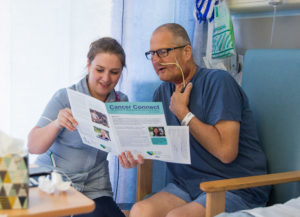Thyroid Cancer
On this page:

The thyroid is a butterfly-shaped gland at the front of the neck which produces thyroid hormone that the body uses to regulate its metabolism, amongst other functions. Thyroid cancer includes a variety of tumours with different biological behaviour, with the vast majority (over 90%) occurring as well-differentiated cancers such as papillary or follicular thyroid cancer, both of which usually have a good prognosis with treatment.
Thyroid cancer is more common in females than males (at a ratio of 3:1), usually after 30; however, it can affect any age group. According to Cancer Research UK (CRUK), there were 3500 new cases of thyroid cancer in the United Kingdom in 2015.
The thyroid cancer team includes:
- Specialist surgeons.
- Clinical nurse specialists.
- Speech and Language therapists.
- Dietitians.
- Medical and clinical oncologists.
- Radiologists and pathologists.
Do I need tests to confirm the diagnosis?
St George’s Hospital offers a comprehensive diagnostic service, including a full range of specialist endoscopic, radiological, and pathology services. A combination of the following tests may be used to determine a diagnosis of thyroid cancer during or following clinic visits:
- Ultrasound scan and Fine needle aspiration biopsy (FNAB) of thyroid nodules
- Magnetic Resonance Imaging (MRI)
- Chest X-ray
- Positron Emission Tomography – Computed Tomography (PET-CT) Scan
What treatments are available?
Thyroid cancer is usually treated with surgery to remove the whole thyroid gland, plus or minus lymph nodes in the thyroid bed or neck. Radioactive iodine treatment may also be required after surgery. In selected low-risk patients with small tumours less than 2cm, surgery to remove one-half of the thyroid gland may be all that is necessary. All thyroid cancer patients will need close follow-up and ongoing surveillance for some years after treatment.
The thyroid surgery team at St George’s Hospital is one of the largest in the United Kingdom. It performs the full complement of surgical procedures for thyroid cancer, within the South West London area, including minimally invasive robotic surgery. St George’s Hospital is also the regional centre for all thoracic surgery. The thyroid surgeons at St George’s Hospital work closely with thoracic surgeons on-site should access to the chest be required for complex cases. We are a joint cancer centre with the Royal Marsden Hospital, where radiotherapy, radioactive iodine, and chemotherapy treatments are provided.
Support and Rehabilitation
Patients and their carers have access to the following:
- Our specialist head and neck nursing staff on the Florence Nightingale ward
- A clinical nurse specialist for information and support throughout the cancer pathway.
- Highly specialist speech and language therapists and Dietitians are providing pre and post-therapy, ongoing rehabilitation in the hospital, and an outreach service closer to home.
- Our physiotherapy team offer rehabilitation on the ward and onward referral if further therapy is required.
- Access to our Macmillan cancer psychological team (CaPS)
- Access to complementary therapy on the ward
- Tracheostomy clinic
What is Personalised Cancer Care?
Personalised Cancer Care means your team will support you to take an active role in your cancer care by giving choices and control based on what matters most.
Together with your key workers’ team, like your Clinical Nurse Specialist and Macmillan Support worker, we will aim to help you access the care and support that meets your individual needs from the moment you receive your cancer diagnosis so that you can live as full, healthy and active a life as possible.
You will be invited to complete a Holistic Needs Assessment (HNA) to identify any concerns you may have when you have been diagnosed with cancer. These concerns may be physical, emotional, practical, financial and spiritual.
You will answer a simple set of questions or fill in a checklist about all areas of your life. It is to find out about the concerns you may have. You are often asked to rate how important these concerns are to you. It could help you decide what to discuss first during the assessment.
Once you have completed the assessment, your Clinical Nurse Specialist will discuss your needs, maybe face-to-face in a clinic or over the phone. During the discussion, you and your Clinical Nurse Specialist will agree on the best ways to manage your needs and concerns. They will write down what you have decided in a document called a care plan. They may write it during the discussion. Or they may make notes and send them to you afterwards. Your care plan will record the following:
- The main concerns you talked about
- Suggestions and actions to help you manage your concerns
- Services that may be able to support you, and any referrals that are made
- What is already being done to help – for example, the services you are already using
- Information about who to contact if you need more help
- The details of other health or social care professionals with whom you have agreed to share the information.
You may not wish to complete the holistic needs assessment at this time. The care you receive will not be affected in any way, and we will be happy to discuss this again in the future
Health and wellbeing information and support also include:
- Access to the Macmillan Information & Support Centre to find out what support is available in the community, e.g., practical, financial, and how to access it
- Help with understanding cancer and its treatment and how to manage its impact through videos and workshops run by healthcare professionals at St George’s and in the community.
- Attend wellbeing activities which are great opportunities for you and your carers to get together with others affected by cancer.

